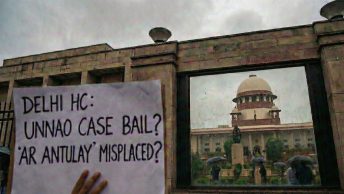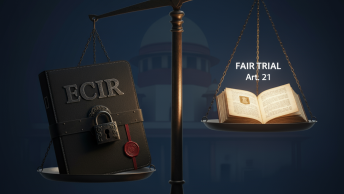In several landmark cases it has been held that if on a failure to complete the investigation within the statutory period prescribed under section 167 of the Code of Criminal Procedure 1973, the accused is ready to furnish bail, he shall be released on bail as a matter of right. This position of law has been upheld and followed in the recent judgment of the Supreme Court in Judgebir Singh v NIA. While this position of law is emancipatory and rights-enabling in one sense of things, from another perspective, the Courts have failed to protect the rights of the accused. This is because firstly, under sections 437 and 439 of the CrPC, the Courts have been provided with the power to impose conditions on the bail such as restrictions upon the right to travel. Second, despite the indefinite delays in the completion of the investigation and submission of a charge-sheet under section 173, litigant-accused are made to comply with these conditions unless the Court grants otherwise.
In this context, this article argues that there ought to be a balance struck between the rights of the investigating agency and the accused, especially in those cases where there has been a delay of more than a year in the completion of investigation. In pursuance of this objective, this article is divided into two parts. The first part lays down principled reasons as to why the same should be allowed. The second part focuses on the detrimental impacts accused have had to go through due to such restrictions, propounding for a framework that accounts for such delays and discrepancies by the state. A caveat at the outset is that the scope of analysis of this paper is limited to cases where the accused has been ready and willing to furnish the required bail.
- Indefinite Imposition of Bail Conditions: A Rights-Based Approach
Despite the registration of the FIR and subsequent cognizance being taken by the police, there may be cases where no police report has been filed u/s 173 of the CrPC because of indefinite delays in investigations. During this interim period, several accused have been granted bail on the condition that they would not leave the jurisdiction of the Trial Court without prior intimation and approval or that they would report to the police station on a particular day every month till the completion of the investigation. While we do not propose a view that rejects these conditions altogether, we would like to emphasize the impact these conditions can have on the rights of the accused, which have been safeguarded under section 167.
Section 167 fulfills a very crucial role within the scheme of the CrPC. In addition to elucidating the route that investigating agencies need to follow in coming to a conclusion as to what the contents of the chargesheet need to be, it is prudent to note that said provision fulfills a more important role in safeguarding the accused his right to personal liberty through the grant of bail. Although we concede that releasing the accused on bail balances two conflicting interests during the period of investigation, this balance cannot be stretched indefinitely to the detriment of the accused.
The proposition we have put forth has been recognized by the Delhi High Court in Bina K Ramani v State. In this case, the Court imposed conditions of bail, including that the petitioner-accused was to report to the police station’s Investigating Officer on the first Saturday of every month, and that she has to surrender her passport and cannot leave the country without the Court’s permission. There was however a 3.5 year delay and the investigation had not been completed. Having acknowledged that these conditions in themselves were not onerous per se, the Court upheld that the petitioner had been denied her right to travel abroad due to the callous attitude of the investigating agency. Permitting such conditions to continue would be tantamount to encouraging their callousness and would violate the grounds of just, fair and reasonable process laid down in Maneka Gandhi. The Court thus waived off the conditions on the basis that she will sign an undertaking, confirming her attendance at the trial.
The necessity of reasonable conditions has also been laid down in the case of Parvez Noordin, where the Court held that the rights of the accused need to be balanced with public interest and the enforcement of criminal justice. The Court also observed that the human right to life and dignity should not be masked behind a facade of unreasonable and onerous bail conditions =.=It is pertinent to note that section 437 gives the Court’s power to impose any conditions on bail “in the interests of justice”. This interest of justice ought to secure the liberty of the accused and not arbitrarily deprive him of his right to livelihood. The presence of conditions which might not be onerous per se but continue to be in force for years after the arrest during the period of investigation no doubt deprives the accused of his liberty.
Other than the principles already mentioned, it is also prudent to note that Article 21 includes the right to a speedy investigation. As observed in AR Antulay v RS Nayak, a right to a speedy trial is a right guaranteed to the accused as it is prudent to determine his innocence or guilt as quickly as possible. This right encompasses all the stages of a trial, the first and foremost being the investigation. The same has also been upheld in Subrata Chattoraj v Union of India, which observed that the right to a speedy investigation is a facet of the right to speedy justice. Considering this dictum of the Supreme Court, prolonging such bail conditions beyond a reasonable period is violative of the right to a speedy investigation. Continuing onerous bail conditions in such circumstances merely adds on to the prejudice that the accused has to undergo before he can be granted bail.
While the judiciary duly acknowledges the fundamental objective of bail, which centers on ensuring the presence of the accused in legal proceedings and concurrently safeguarding the interests of both the victims and the broader societal fabric, an underlying disconcerting asymmetry becomes palpable. The exercise of such powers has predominantly been examined through the prism of their efficacy in furthering the exigencies of expeditious police investigations. It is notable, however, that incarceration endures unabated, irrespective of the eventual grant of bail to the accused, thus delineating a peculiar dichotomy in its ramifications. Having demonstrated the principled reasons behind why the accused should be granted an exemption from the bail conditions after a reasonable time of investigation has lapsed, we will now show precedents where the detrimental impacts of the same are reflected.
2. Indefinite Imposition of Bail Conditions: An Analysis of the Deprivation of Rights:
At the outset, it is prudent to clarify that the scope of section 167 is not limited to investigations carried out by the police but includes that done by the CBI and other investigating agencies. In individual cases, the accused is made to file an application for exemption before the relevant High Court to set aside the bail condition so imposed. For instance, in the case of Kenal Vrajmohan Shah, the accused filed an application to set aside conditions restraining foreign travel without the Court’s prior permission. Further, he also filed to set aside a condition that necessitated his presence at the department on two specific dates every month till the time the chargesheet was filed. While a rights-based approach has been adopted to challenge indefinite incarceration as a result of the bail conditions in a prolonged trial, the same line of reasoning has not been adopted to propound the right to a speedy investigation. The classic approach taken is one where an appeal is made to the Court on the basis of past compliance and prejudice caused to the accused.
The impact on the rights enunciated in the previous section = is particularly evident in the bail conditions imposed on Prof. Varavara Rao, in Elgar Parishad case which raise concerns about the broad and vague language used, rendering them akin to custody rather than true freedom. In Prof. Rao’s case, the bail conditions include restrictions on his movement, his expression of opinions that might be seen as detrimental to the case, and any activity that could exacerbate the charges against him. These stringent conditions effectively limit his ability to travel freely within the country and hinder his profession as a poet. Considering the ongoing investigation spanning five years and his medical condition, these conditions seem to amount to an infringement upon his right to a dignified life.
A similar instance can be seen in the Raneef case, where an accused doctor who provided medical treatment to individuals allegedly involved in unlawful activities faced restrictions that hindered his medical practice. The bail order was heard a year and half post the arrest of the accused and the anticipated time for conclusion of trial extended to a few more years in the court’s opinion while deciding the bail order. Such bail conditions, seemingly aimed at complying with statutory investigation timelines, risk unjustly denying individuals their rights guaranteed by the constitution.
While judicial cognizance is accorded to the overarching purpose of bail – the assurance of the accused’s presence in legal proceedings and the concomitant safeguarding of the interests of both victims and the societal corpus – a somber lacuna exists in the equitable balance. This pertains to the discernible oversight, whereby the inviolable rights inherent to the accused are occasionally eclipsed during the bail determination process. Thus, the resultant corollary manifests in a rather disquieting paradigm where bail becomes a fruitless existence with diminished liberties falling short of formal detention.
It thus becomes prudent to examine the way forward – how can a rights-based framework be propounded? The object of these conditions is securing the attendance of the accused at trial and not the imposition of punitive or preventative measures. Keeping in mind one year of delay as the threshold which has been judicially established as the reasonable time within which an investigation should be completed, we suggest that accused be exempted from compliance from their bail conditions considering that their right to a speedy investigation has been violated after this time period. While Courts can certainly examine past compliance with conditions, the emphasis lies on acknowledging the rights violated and the necessity to propound an approach that guarantees these rights. An approach such as this strikes a fine balance of rights with the concerns of the state.
Conclusion
A demonstration of the problems with indefinite bail conditions raises a crucial question: does the rationale behind setting bail conditions truly balance the rights of the accused? The choice between securing bail and leading a dignified life should not be so stark. The cumulative impact of such conditions, particularly in cases involving national security laws, calls for a careful reevaluation of the balance between the pursuit of justice and the preservation of fundamental rights enshrined in the constitution. There ought to be an exemption from bail conditions on Article 21 grounds if compliance with these conditions can be shown, considering that rights such as those to travel have been violated.
Rakshit Agarwal and Samriddha Basu are Third-Year Law Students in the B.A.LL.B (Hons) program at NLSIU Bangalore.







[…] Posted byAvani Vijay […]
yes , its very important and helpful information for us.
Additionally , Bail conditions balance freedom and restraint, enabling the accused to remain free while imposing necessary limitations to ensure court appearances and public safety, sparking ongoing debate on fairness.
For more details visit : https://juarezlegal.com/